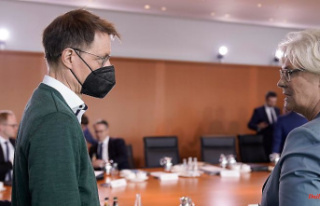The gas price cap is coming - this is what the new delimbing package with a volume of 200 billion euros provides for. The question of financing will probably become heated, because according to a report important questions about the 9-euro ticket successor are still unanswered in a decision paper for the federal and state round.
According to an RND report, before the federal-state consultations on Tuesday, important financing issues, such as the modernization and expansion of public transport, are left open in a preparatory paper for the third relief package. Instead of the increase in so-called regionalization funds by 1.65 billion euros a year demanded by the federal states, the federal government is offering an increase of 1.5 billion euros each, as the RND writes. A condition for this is also that the countries participate in "at least the same amount".
The federal government makes the regionalization funds available to the federal states every year to finance local rail transport. The background is that the federal states have been responsible for this area since the railway reform in the 1990s. The money is earmarked, so it must not be spent on anything else. The debate about the regionalization funds is closely related to the question of the extent to which there should be a successor regulation for the 9-euro ticket. According to the RND report, the draft resolution calls on the transport ministers to quickly determine the details. From the point of view of the federal states, the financing "must be considered beyond the general development of regionalization funds", the federal government must therefore "contribute the additional amounts that are necessary to be able to implement permanently cheap and attractive tariff models". However, the federal government left this demand unanswered in its paper.
According to the report, the paper also leaves open how the financing of the housing benefit reform should be divided between the federal and state governments. The reform aims to expand the group of beneficiaries and increase benefits. The states are demanding that the federal government bear the costs. The federal government is also reacting evasively to the question of refugee financing. "The federal and state governments will bring the agreed talks on refugee financing to a close in a timely manner," says the proposed resolution. You are already participating "now in the costs of the countries in the amount of 5.5 billion euros annually". The federal states had demanded a permanent contribution from the federal government to the refugee-related costs retrospectively from January 1, 2022. The financial participation must include the volume that the federal government has provided "in the years up to 2021".
The heads of government of the federal states had already met last Wednesday and discussed the right reactions to the energy and price crisis. A conversation with Chancellor Olaf Scholz was originally supposed to follow on the same day, but the consultations were postponed to Tuesday because of his corona disease. On Thursday, the federal government presented further measures, in particular plans for a gas price brake.












